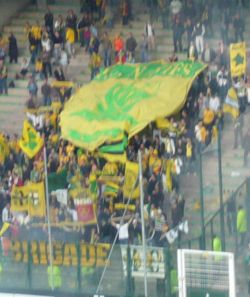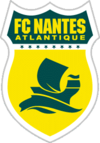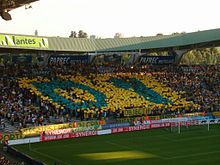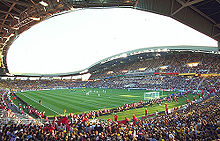- FC Nantes
-
Nantes 
Full name Football Club de Nantes Nickname(s) Les Canaris (The Canaries) Founded 1943 Ground La Beaujoire-Louis
Fonteneau, Nantes
(Capacity: 38,285)Chairman Waldemar Kita Manager Philippe Anziani League Ligue 2 2010-11 13th Website Club home page Home coloursAway coloursFootball Club de Nantes (Breton: Naoned, Gallo: Naunnt; commonly referred to as simply Nantes) is a French association football club based in Nantes, Pays de la Loire. The club was founded on 21 April 1943, during World War II, as a result of local clubs based in the city coming together to form one big club. From 1992–2007, the club was referred to as FC Nantes Atlantique before reverting to its current name at the start of the 2007–08 season. Nantes currently play in Ligue 2, the second division of French football. The club has spent the majority of its life in Ligue 1, but last played in the league in 2008. The first-team is currently managed by Landry Chauvin and captained by defender Matheus Vivian.
Nantes is one of the most successful clubs in French football having won eight Ligue 1 titles, three Coupe de France wins, and attained one Coupe de la Ligue victory. The club is famous for its jeu à la nantaise, its collective spirit, mainly advocated under coaches José Arribas, Jean-Claude Suaudeau and Raynald Denoueix and for its youth system, which has produced players such as Marcel Desailly, Didier Deschamps, Mickaël Landreau and Christian Karembeu. As well as Les Canaris (English: The Canaries), Nantes is also nicknamed Les jaunes et verts (English: The Green and Yellows) and La Maison Jaune (English: The Yellow House).
Contents
History
In 1943, Nantes had five football clubs (Saint-Pierre, Stade Nantais UC, AC Batignolles, ASO Nantaise and Mellinet). However, Mellinet’s manager, Marcel Saupin, realized that Nantes could have a better chance of sporting success if all five clubs merged into one. Following the merger of all five clubs into FC Nantes, Saupin declared, “Today we are a small team, but we will become a great team if we work together one day”. The green and yellow of the club's strip were chosen with reference to the racing horse stables of Jean le Guillou, one of the club's founders.
Following the club’s first season, Saupin ventured to Paris, along with other club members, where many young footballers were emigrating into the provinces in order to avoid having to carry out forced labor in Germany due to the Service du travail obligatoire. Here he found the club a professional trainer, as well as several quality players after which Saupin became the club chairman in 1944. Following the group’s success, its healthy finances and because Saupin was a personal friend of Gabriel Hanot, the club became part of the Groupement des clubs autorisés, a precursor to the Ligue de Football Professionnel, and subsequently became a professional team when the war ended in July 1945.
The first match Nantes played as a professional team took place at the Stade Olympique de Colombes against CA Paris, where FC Nantes triumphed 2–0. The first home match was a defeat of the same score against AS Troyes. The club finished fifth at the end of this first season following which the club’s manager Aimé Nuic left the club following a dispute, and was succeeded by Antoine Raab who took over in a player-coach role. After winning 16 consecutive matches, Nantes bowed down 9–0 to Sochaux. In 1963, the town council decided to give substantial subsidies to the club to give it a leg-up to climb into the next division.
On the first of June 1963, the club won its place in the first division against Sochaux. Marcel Saupin died on 10 June and would never see the club he created amongst the elite. Nantes went on to win the 1964–65 and 1965–66 league titles with a well polished game, partly thanks to José Arribas, a fan of a more offensive game strategy who was making his first contributions to that which would become known as the jeu à la nantaise.
It was during this period that the famous jeu à la nantaise, made up of well-oiled and offensive tactics, made its appearance. In the summer of 1976, Arribas departed his role as manager and the reins were handed to Jean Vincent. The former player, who had played for Stade Reims during the club's successful years, remained the team’s manager until 1982 when Jean-Claude Suaudeau, another fan of the jeu à la nantaise style of play and a former Nantes player, replaced him.
Apart from the titles of French champion which Nantes held in 1973, 1977, 1980 and 1983, the club won their first Coupe de France in 1979 against Auxerre courtesy of a 4–1 victory after extra time. Eric Pécout inserted his name into Nantes folklore by converting a hat-trick in the match. In June 1983, Nantes battled out a Coupe de France final against Paris Saint-Germain. In the match, Nantes striker José Touré scored a memorable goal, but, nevertheless, Nantes lost the match 3–2 preventing the club from obtaining the league and cup double.
Nantes really spread its wings during the 1982–83 season, and even it’s most dangerous rival (Girondins de Bordeaux) ceded underneath the offensive pressure exerted by the club, and left the game at Nantes home Marcel Saupin stadium defeated at 4–0, partly thanks to a well-oiled match and the golden touch of the Yugoslavian player Vahid Halilhodžić, responsible for a total of 27 goals, and who finished best striker of the championship.
After being at the top of the table for several years, then coming second in the 1984-5 championship (behind Bordeaux) and in 1985-6 (behind Paris Saint-Germain), FC Nantes went through a much more difficult period. In 1988, Jean-Claude Suaudeau’s place at the head of the first team was taken over by Miroslav Blazevic. His results were not, however, in line with the clubs ambitions – Nantes coming 7th in 1988-9 and 1989–90 and gaining a pitiful 15th place in 1991, having no title to add to their record during these three seasons. In July 1991 the club re-instated Jean-Claude Suaudeau, and in July 1992, the after spending a fortnight in the second division due to an administrative decision by the DNGG (French Football’s financial regulator), FC Nantes is renamed FC Nantes Atlantique, and is able to take its place in the 1st Division back.
In 1992, the jeu à la nantaise made its comeback. The club subsequently made the finals of the French Championship in 1992-3; semi-finals of the French Cup in 1993-4; won the 1994-5 Championship and was Semi finalist in the Champion’s league of 1995–6. This period saw the development of a host of players such as Japhet N'Doram, Patrice Loko, Reynald Pedros, Nicolas Ouédec, Claude Makélélé, and Christian Karembeu.
Between 1995 and 1997 the club underwent financial difficulties and the best players left one after the other with mixed futures: Loko, Ouedec and Pedros quickly forgotten and dropped from the Equipe de France shortly after Euro 96; Japhet N’Doram fought against persistent injuries at AS Monaco; whilst Karembeu and Makelele fared better, managing to succeed abroad (notably at Real Madrid) and both become active members of the French team.
Tired of the transfers of his best players at the end of each season, Jean-Claude Suaudeau quit the footballing world in 1996 and handed over the ropes to Raynald Denoueix, previously the second team’s coach.
After a catastrophic beginning to the 1996–7 season, the team finished 3 place in the championship after playing 30 games without a single defeat. They were deprived of qualification in the champion’s league by AS Monaco (with a score of 2–1). After this, FC Nantes Atlantique stagnated in the middle of the table for a few seasons but finally found a buyer after becoming champion once more in 2001 with Viorel Moldovan, Eric Carrière or Salomon Olembé. It was then bought out by Socpresse (a media group) who designated a chairman who was completely oblivious to the footballing world: Jean-Luc Gripond.
On 11 March 2004, Groupe Dassault became the new owner of the club after buying out the Socpresse group. Dassault didn't intervene in the running of the club and left the executive team as it was, thus showing that it never really wanted to own the football club, and whose only aspiration was to not lose money from it. In the 2003/4 season, Nantes was defeated by Sochaux after its captain and goalkeeper Mickaël Landreau misses a goal during a penalty shoot-out, thus depriving the team of the League Cup, and a spot in the UEFA Cup.
The following season was the worst the club ever had since it rose into ligue 1, with Nantes narrowly missing relegation. During this season the club had an unprecedented crisis, with the revolt of the players led by Landreau, calling for the sacking of their manager Loïc Amisse; the team’s supporters also joined in the revolt, notably at a match at Sochaux where they ripped out over 150 seats and injured 4 stewards in a vain attempt to stir up Chairman Gripond.
Before the start of the 2005/6 season, Serge Dassault’s team asks executives Robert Budzynski and Kléber Bobin as well as the players Mickaël Landreau and Frédéric Da Rocha to leave. At the same time Vahid Halilhodzic is approached to become manager, even though Serge Le Dizet had only been in place for six months. Jean-Luc Gripond was also finally replaced by Rudi Roussillon on 28 June 2005 following an Extraordinary meeting of the Dassault group.
On 20 September 2006, Georges Eo replaced Serge Le Dizet as club manager. He would only hold this position for five months however, being replaced by the duo Michel Der Zakarian / Japhet N'Doram on 12 February 2007. On 9 May of the same year, despite their victory against Bordeaux (1–0), FC Nantes was mathematically relegated to the league below. The Yellows would therefore get ready to dispute their 19th Ligue 2 season in the club’s history. This season would be smitten by the coming and going of a record number of assistant managers, by the arrival and the departure of Fabien Barthez and by the crowds invading the pitch at the last home match of the season against Toulouse in the 86th minute.
On 30 July 2007, the club played its first Ligue 2 match since 1963. The summer was marked by a busy Mercato, and by the handing over of the club to a new owner. During the first part of the season, the players adopted their role as division favourites with perfection, despite a 4–0 defeat against Boulogne-sur-Mer. Waldemar Kita continued to renovate the club: the club changed both its name and its insignia, returning to the three letters FCN, dropping the “Atlantique”. Nevertheless, the start of 2008 was the most difficult with 2 defeats (Clermont and Le Havre), and the elimination from the Coupe de France (after penalty shoot out against Sedan, the first at this stage for 6 years). Three consecutive wins against Brest, Bastia and Sedan (with 4 goals from new recruit Filip Đorđević) helped Nantes regain momentum, and allowed them to conclude the championship a little more at their ease.
Nantes secured a return to Ligue 1 on 25 April 2008, with a 1–1 draw against Montpellier. In the 2008–09 Ligue 1 season, Nantes finished 19th and were relegated back to Ligue 2. At the moment the club struggles to get more than 10,000 fans into a 37,000 seater stadium.
Stadia
- Stade Malakoff (renamed Stade Marcel-Saupin in 1963) – from 1945 to 1984 (then reserve team until 2007, now under renovation).
- Stade de la Beaujoire (renamed Stade de la Beaujoire Louis-Fonteneau in 1989) – since 1984.
- Stade Michel Lecointre (stadium of the reserve team) – since 2007
Players
Current squad
As of 19 July 2011.[1] Note: Flags indicate national team as has been defined under FIFA eligibility rules. Players may hold more than one non-FIFA nationality.
No. Position Player 1 
GK Rudy Riou 2 
DF Vincent Sasso 3 
DF Papy Mison Djilobodji 4 
DF Matheus Vivian (captain) 5 
DF Olivier Veigneau 6 
DF Jonathan Martins 7 
MF Bruno Cheyrou 8 
MF Vincent Bessat 9 
FW Filip Djordjević 10 
FW Christian Bekamenga 11 
FW Sylvain Wiltord 12 
MF Papa Malick Ba 13 
MF Fabrice Pancrate 14 
MF Ismaël Keïta 15 
FW Lee Yong-Jae 16 
GK Erwin Zelazny No. Position Player 17 
FW Maurice Dalé 19 
MF Serge Gakpé 20 
MF Adrien Trebel 21 
FW Granddi N'Goyi 22 
DF Damien Tixier 23 
DF Issa Cissokho 24 
DF Chaker Alhadhur 25 
MF Jordan Veretout 26 
DF Koffi Djidji 27 
FW Florian Raspentino 28 
FW Mohamed Diallo 29 
DF Kemokho Cissokho 31 
MF Yero Diop 32 
MF Omar Benzerga 40 
GK Maxime Dupé Reserve squad
- Head Coach: Loïc Amisse
Note: Flags indicate national team as has been defined under FIFA eligibility rules. Players may hold more than one non-FIFA nationality.
No. Position Player 
GK Julien Dupas 
GK Nassim Badri 
DF Pierre Bocquier 
DF Alassane Edou Yebe 
DF Anthony Walongwa 
MF Irélé Apo 
MF Jonathan Blonbou 
MF Loïs Diony No. Position Player 
MF Jason Henry 
MF Anthony Ihou 
MF Jules Iloki 
MF Lamine Ndiaye 
MF Alexandre Wroblewski 
FW David Langevin 
FW Aristote Ndongala 
FW Saad Trabelsi Notable players
Below are the notable former players who have represented Nantes in league and international competition since the club's foundation in 1943. To appear in the section below, a player must have played in at least 100 official matches for the club.
For a complete list of FC Nantes players, see Category:FC Nantes players
Former managers
- 1943–46 :

 Aimé Nuic
Aimé Nuic - 1946–49 :

 Anton Raab
Anton Raab - 1949–51 :
 Antoine Gorius
Antoine Gorius - 1951–55 :
 Émile Veinante
Émile Veinante - 1955–56 :

 Anton Raab
Anton Raab - 1956 :
 Stanislas Staho
Stanislas Staho - 1956–59 :
 Louis Dupal
Louis Dupal - 1959–60 :
 Karel Michlowski
Karel Michlowski - 1960–76 :
 José Arribas
José Arribas - 1976–82 :
 Jean Vincent
Jean Vincent - 1982–88 :
 Jean-Claude Suaudeau
Jean-Claude Suaudeau - 1988–90 :
 Miroslav "Ćiro" Blažević
Miroslav "Ćiro" Blažević - 1992–97 :
 Jean-Claude Suaudeau
Jean-Claude Suaudeau - 1997-01 :
 Raynald Denoueix
Raynald Denoueix - 2001–03 :
 Angel Marcos
Angel Marcos - 2003 – December 2004 :
 Loïc Amisse
Loïc Amisse - January 2005 – September 2006 :
 Serge Le Dizet
Serge Le Dizet - September 2006 – 12 February 2007 :
 Georges Eo
Georges Eo - 12 February 2007–2007 :

 Michel Der Zakarian and
Michel Der Zakarian and  Japhet N'Doram
Japhet N'Doram - 2007–08 :

 Michel Der Zakarian
Michel Der Zakarian - 2008–09 :
 Elie Baup
Elie Baup - 2009 :
 Gernot Rohr
Gernot Rohr - 2009–10 :
 Jean-Marc Furlan
Jean-Marc Furlan - 2010–11 :
 Baptiste Gentili
Baptiste Gentili - 2011–11 :
 Philippe Anziani
Philippe Anziani - 2011– :
 Landry Chauvin
Landry Chauvin
Honours
- Ligue 1
- Champions (8): 1965, 1966, 1973, 1977, 1980, 1983, 1995, 2001
- Coupe de France
- Champions (3): 1979, 1999, 2000
- Trophée Des Champions
- Champions (2): 1999, 2001
- Coppa delle Alpi
- Champions (1): 1982
References
External links
Division 2 / Ligue 2 seasons Division 2
(1933–2002) 1933–34 · 1934–35 · 1935–36 · 1936–37 · 1937–38 · 1938–39 · 1939–40 · 1940–41 · 1941–42 · 1942–43 · 1943–44 · 1944–45 · 1945–46 · 1946–47 · 1947–48 · 1948–49 · 1949–50 · 1950–51 · 1951–52 · 1952–53 · 1953–54 · 1954–55 · 1955–56 · 1956–57 · 1957–58 · 1958–59 · 1959–60 · 1960–61 · 1961–62 · 1962–63 · 1963–64 · 1964–65 · 1965–66 · 1966–67 · 1967–68 · 1968–69 · 1969–70 · 1970–71 · 1971–72 · 1972–73 · 1973–74 · 1974–75 · 1975–76 · 1976–77 · 1977–78 · 1978–79 · 1979–80 · 1980–81 · 1981–82 · 1982–83 · 1983–84 · 1984–85 · 1985–86 · 1986–87 · 1987–88 · 1988–89 · 1989–90 · 1990–91 · 1991–92 · 1992–93 · 1993–94 · 1994–95 · 1995–96 · 1996–97 · 1997–98 · 1998–99 · 1999–2000 · 2000–01 · 2001–02Ligue 2
(2002–present) 2002–03 · 2003–04 · 2004–05 · 2005–06 · 2006–07 · 2007–08 · 2008–09 · 2009–10 · 2010–11 · 2011–12List of French second division championsChampionnat de France Amateurs 2 — Groupe H • 2009-10 Clubs Alençon • Changé • Concarneau • Dives • Ecommoy • La Chapelle-des-Marais •
Mondeville • Montagnarde • Saint-Lô • Saint-Malo • Vertou • Vitré
Reserves : Brest • Guingamp • Laval • Lorient
Wikimedia Foundation. 2010.




